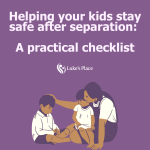Helping your kids stay safe after separation: A practical checklist
Separation can bring big changes, especially for children. As you sort out parenting arrangements, it’s essential to think about how to keep your kids safe, supported, and prepared. This checklist offers simple and practical ways to help your child feel more secure and know what to do in situations that might feel confusing or unsafe.
This checklist is based on our toolkit, The Law and Parenting Arrangements Post-Separation, created to support woman and their children leaving a relationship in which they have been subjected to abuse.
To help you get started, here are some simple safety steps you can walk through together:
- Home alone safety
- Have you talked to your child about what to do if your ex-partner shows up while they’re home alone?
- Do they know not to open the door, even if the other parent says it’s “urgent” or tries to convince them otherwise?
Tip: Abusers may use emotional tactics or threats to manipulate children. Make sure your child knows it’s never their responsibility to manage the situation.
- Phone and tech safety
- Does your child know not to answer calls from blocked or unknown numbers?
- Have you practiced what to do if they receive a call from the other parent?
- Safe adults and trusted contacts
- Do your children have “safe adults” they can trust—a teacher, doctor, friend’s parents, religious leader, an Indigenous Elder, their sports coach or an extended-family member?
- Code word and safety plans
- Do you have a code word? Do your children know what to do when they hear it? Do they know that the code word is a secret?
- Have you discussed a plan for what you’ll do if the abuser breaks in or shows up at the home and won’t leave?
- Emergency Preparedness
- Does your child know your address and how to call 911?
- Is there a safe room in your home with a phone, lock, and more than one exit?
- School and Activity Support
- Does the staff at the child’s school, day care, extracurricular activities and other relevant people/places know about the situation?
- Do these contacts understand that the other parent is not allowed to pick up the child?
For more information on parenting arrangements post-separation, check out our FREE toolkit.
If you want to know more about family law and court, access our family court survival workbook, available in English or French.

